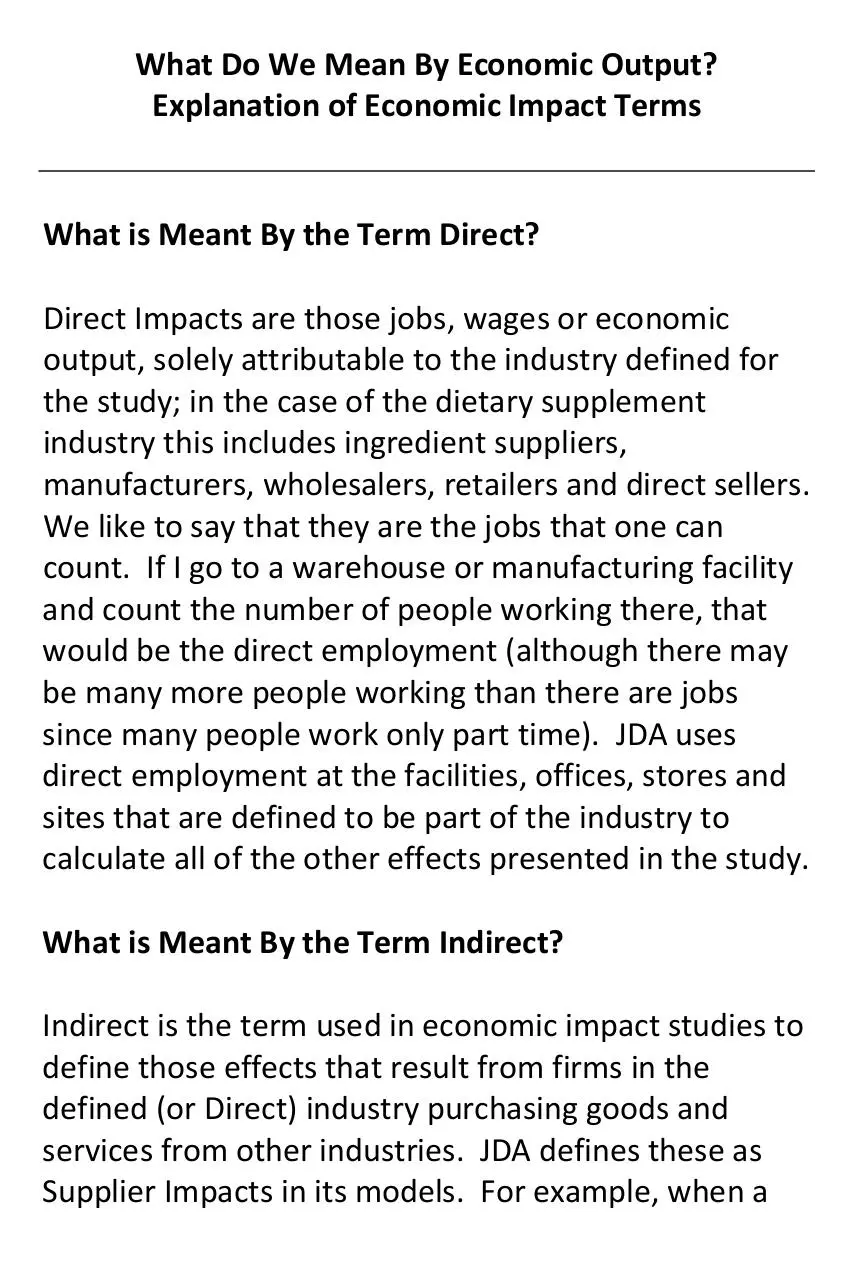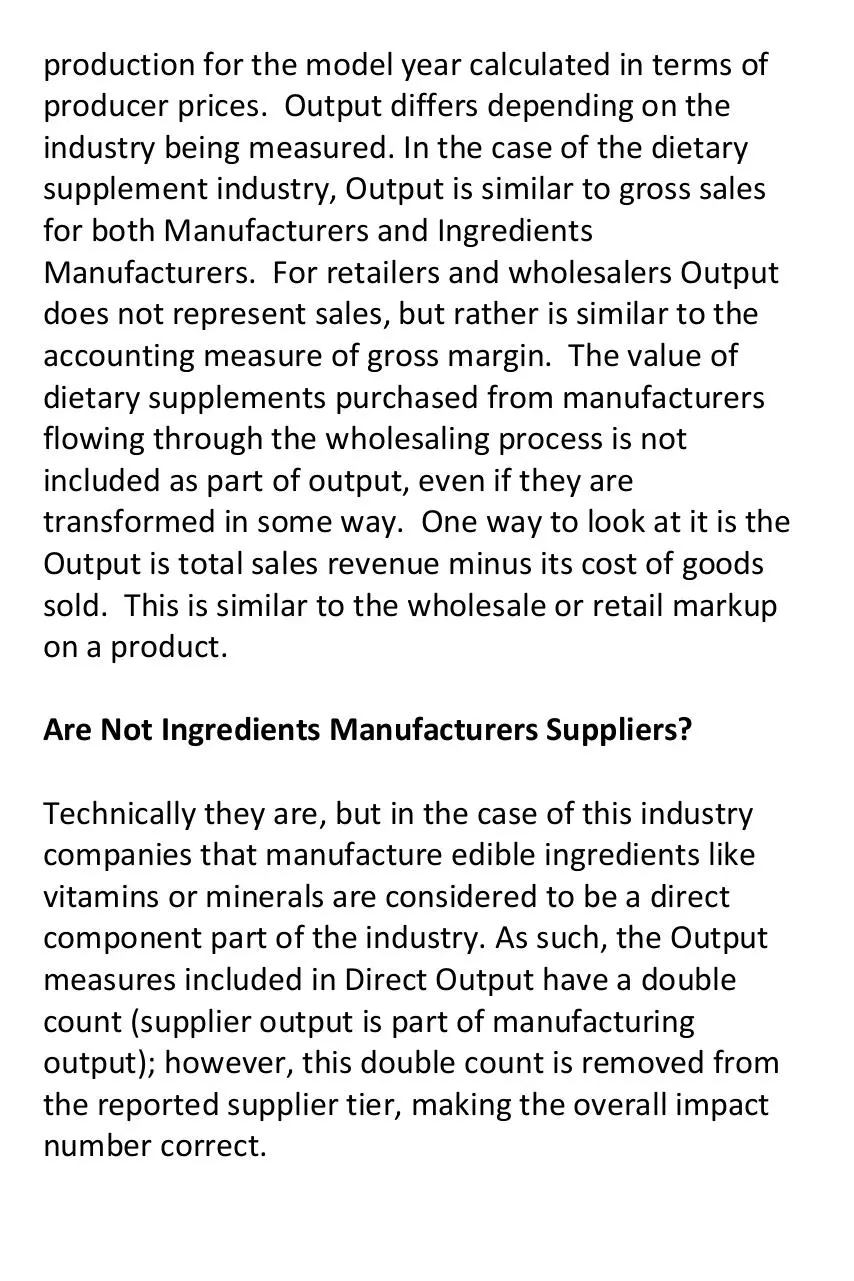What Do We Mean By Economic Output (PDF)
File information
Author: John R. Dunham
This PDF 1.5 document has been generated by Acrobat PDFMaker 11 for Word / Adobe PDF Library 11.0, and has been sent on pdf-archive.com on 04/06/2016 at 00:46, from IP address 192.31.x.x.
The current document download page has been viewed 414 times.
File size: 87.92 KB (4 pages).
Privacy: public file




File preview
What Do We Mean By Economic Output?
Explanation of Economic Impact Terms
What is Meant By the Term Direct?
Direct Impacts are those jobs, wages or economic
output, solely attributable to the industry defined for
the study; in the case of the dietary supplement
industry this includes ingredient suppliers,
manufacturers, wholesalers, retailers and direct sellers.
We like to say that they are the jobs that one can
count. If I go to a warehouse or manufacturing facility
and count the number of people working there, that
would be the direct employment (although there may
be many more people working than there are jobs
since many people work only part time). JDA uses
direct employment at the facilities, offices, stores and
sites that are defined to be part of the industry to
calculate all of the other effects presented in the study.
What is Meant By the Term Indirect?
Indirect is the term used in economic impact studies to
define those effects that result from firms in the
defined (or Direct) industry purchasing goods and
services from other industries. JDA defines these as
Supplier Impacts in its models. For example, when a
dietary supplement manufacturer pays rent on its
warehouse to their landlord, or when they hire a
trucking company to deliver products they are creating
indirect effects in the real estate sector or trucking
sector of the economy.
In the case of retailers, wholesalers, truckers and
others that handle products through a supply chain,
the value of the goods moving through a warehouse or
a store are not counted as indirect impacts; only those
goods and services used to provide the wholesaling,
transportation or retail services are included. So if a
wholesaler buys dietary supplements to in turn sell to a
vitamin shop or grocery store, that purchase is not
included as a supplier effect.
What is Meant By the Term Induced?
Induced effects are the response by the economy that
occur through re-spending of income received by
payments made to employees and business owners
measured in the direct and supplier parts of the
economy. When people work for a retailer or a dietary
supplement manufacturer or for firms that supply
goods and services to the industry, they receive wages
and other payments. This money is recirculated
through their household spending inducing further
local economic activity. Economists call these induced
impacts the multiplier effect of an activity or industry.
Examples of induced effects are the jobs created in a
diner located outside of a plant gate where people
purchase sandwiches for lunch, or at the gas station
where they purchase fuel for their commute, or even
in neighborhoods, where workers purchase houses, go
to restaurants or visit the movie theater.
What Specifically Do You Mean When You Say a Job?
Jobs are a measure of the annual average of monthly
jobs in each industry as defined by the Quarterly
Census of Employment and Wages put out by the BLS.
Jobs in our models are derived independently and do
not match jobs reported by government entities in that
we often define industries differently, and because we
include more firms and facilities than are surveyed by
the government. Jobs are measured in full-time
equivalent units.
What is Meant by The Term Economic Output or
Economic Impact?
JDA uses output in its models as a general
measurement of economic impact because we believe
that it is the broadest and most comparative measure.
In general, output represents the value of industry
production for the model year calculated in terms of
producer prices. Output differs depending on the
industry being measured. In the case of the dietary
supplement industry, Output is similar to gross sales
for both Manufacturers and Ingredients
Manufacturers. For retailers and wholesalers Output
does not represent sales, but rather is similar to the
accounting measure of gross margin. The value of
dietary supplements purchased from manufacturers
flowing through the wholesaling process is not
included as part of output, even if they are
transformed in some way. One way to look at it is the
Output is total sales revenue minus its cost of goods
sold. This is similar to the wholesale or retail markup
on a product.
Are Not Ingredients Manufacturers Suppliers?
Technically they are, but in the case of this industry
companies that manufacture edible ingredients like
vitamins or minerals are considered to be a direct
component part of the industry. As such, the Output
measures included in Direct Output have a double
count (supplier output is part of manufacturing
output); however, this double count is removed from
the reported supplier tier, making the overall impact
number correct.
Download What Do We Mean By Economic Output
What Do We Mean By Economic Output.pdf (PDF, 87.92 KB)
Download PDF
Share this file on social networks
Link to this page
Permanent link
Use the permanent link to the download page to share your document on Facebook, Twitter, LinkedIn, or directly with a contact by e-Mail, Messenger, Whatsapp, Line..
Short link
Use the short link to share your document on Twitter or by text message (SMS)
HTML Code
Copy the following HTML code to share your document on a Website or Blog
QR Code to this page

This file has been shared publicly by a user of PDF Archive.
Document ID: 0000380116.